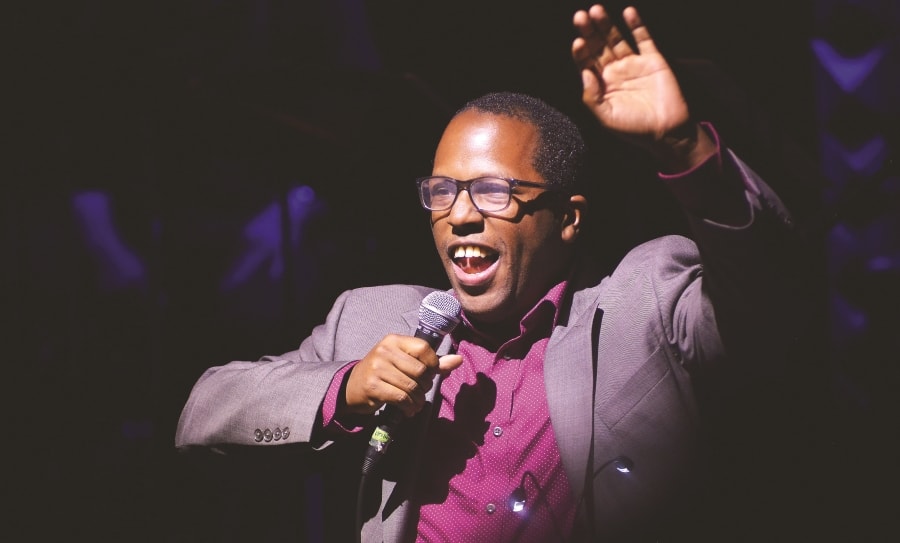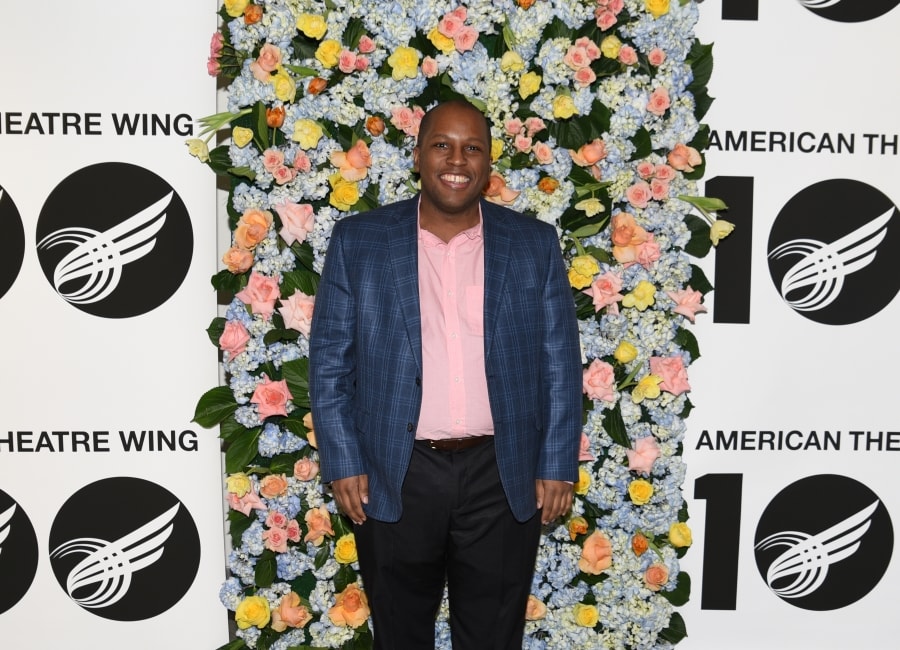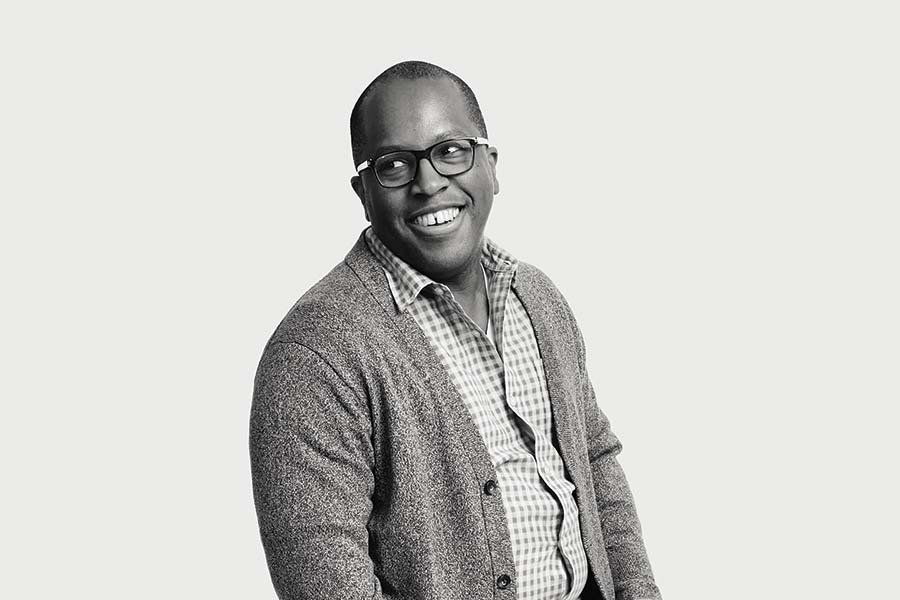Writer Michael R. Jackson’s artistry draws from many influences: musicals he saw as a kid, politics, films by Todd Solondz, music by Liz Phair and Tori Amos. The list goes on. These are all in some way mixed into his evocative musical A Strange Loop, whose title is a sly reference to the show’s premise: It’s about a gay Black man writing a musical about a gay Black man writing a musical. It premieres at Playwrights Horizons in late spring/early summer (May 24-July 7), marking Jackson’s Off-Broadway debut as a composer, lyricist, and bookwriter.
Jackson’s narrative journey began with soap operas, a form he’s loved since before grade school; as a boy growing up outside Detroit he watched them with his great aunt Ruth. Soaps weren’t just a connection to his aunt but a fundamental building block of his aesthetic. “I love the form of melodrama,” says Jackson during our conversation at the Pershing Square Signature Center’s Signature Cafe + Bar. “It was helpful for other writing I would do later. I could always go, ‘What if…’ because my brain was primed to think of stories as never-ending.”
Like a loop, in fact. Jackson describes his new show as Company meets Passing Strange; it’s not a traditional book musical with chronological scenes but instead depicts the experiences of a character trying to overcome his self-destructive tendencies. It began as a monologue he wrote after graduating from New York University’s Dramatic Writing Program titled “Why I Can’t Get Work.” The character was basically him, “a young Black gay man walking around New York trying to understand his own alienation, in real time,” as Jackson describes it. Aside from writing, he was applying to graduate schools and jobs, mostly in soap opera writing, and decided he’d take whatever opportunity he got first.
He landed back at NYU in their Graduate Musical Theatre Writing program in 2003. He’d grown up playing the piano for church and making up songs but knew nothing about writing lyrics. He figured he’d better learn. He was admitted as a book writer and lyricist, but took an elective with songwriter and composer Mike Reid. At one point a song by classmate inspired a song of his own, built around the phrase, “All those Black gay boys I knew who chose to go on back on the Lord.” That song, now called “Memory Song,” is in A Strange Loop.
Soon he began writing his own songs on the side, though he had no formal training in notation. He taught himself as much as he could, then found an essential collaborator in music director and arranger Adam Wiggins. In the 10 or so years they’ve worked together, they’ve developed a process by which Jackson prepares the sheet music to the best of his ability, then Wiggins polishes it and ensures it’s playable. “Without that collaboration, I don’t think A Strange Loop could have taken advantage of many of the opportunities it had,” Jackson says.
Another early collaborator, Maria Manuela Goyanes, now the artistic director of Woolly Mammoth Theatre Company, directed some of Jackson’s plays at the Rebel Verses Youth Arts Festival, and they talked about how they might combine his “Why I Can’t Get Work” monologues with some of his songs to create a complete piece. One version had the main character, Usher (named after one of Jackson’s previous day jobs: an usher at the New Amsterdam Theatre), who is obsessed with Liz Phair. Why her? Her 1993 album Exile in Guyville had stunned the 20-something Jackson.
“I couldn’t believe someone had written such an honest, funny, musically interesting self-examination of herself,” he explains. “The whole album takes you on a journey.” For one draft, Jackson wrote various mashups of his own songs with Phair’s, the idea being that Usher was trying to talk to Phair through his music.
Jackson soon turned to Stephen Brackett, who had directed two of his concerts preivously, one at Joe’s Pub and one at the Laurie Beechman Theatre. Brackett took to the show immediately. “I was drawn to the fact that it was so deeply personal and that it was a reflection of Michael on the page,” he says. “But I could also feel the larger themes of isolation and having ambitions to change into a better person and artist, and struggling with your family’s understanding of your identity and feeling stuck in the body you’ve been born into.”
He also made a suggestion that proved to be a turning point in the development of the piece: to cast only people who are Black and queer, from the main character of Usher to the ensemble, who depict Usher’s thoughts. “That idea opened a door for me,” Jackson says. “It made so much sense for the themes that were in the piece already.”
A reading of the show illuminated another casting element: Usher struggles with body image. In addition to a good actor, they needed someone overweight who would be able to both convey and understand that struggle. “All of that is part of Usher,” Jackson says. “How he moves through the world and learns to accept himself in the body and skin that he’s in. I wanted to make sure the actor who was cast was someone who could believably represent that experience.” The part of Usher eventually went to actor/writer Larry Owens.

Jackson then met Shakina Nayfack, who was then forming the Musical Theatre Factory, an organization that helps writers develop new musicals, and she invited Jackson to bring A Strange Loop to the inaugural writers group. Nayfack also arranged a two-week residency and reading, which Brackett directed.
The piece began to move forward. After a successful concert at Feinstein’s/54 Below, Kent Nicholson, the musical theatre producing associate at Playwrights Horizons, decided it was time for his colleagues to see the piece. Nicholson had first met Jackson around 2009; when he was forming a musical theatre writers group at Ars Nova, he invited Jackson and Anna K. Jacobs, his collaborator on another musical, Teeth, to join. “It’s clear from the minute you hear [Jackson’s] work he’s got a really unique voice,” Nicholson says. “It’s personal, it’s thought-provoking, it’s political, satirical, heartfelt.”
A reading at Playwrights happened a few days after the 2016 presidential election. “It was actually a blessing,” Jackson recalls. “The mood in the room was so dark, people were like zombies. This musical is a raucous, very honest, emotional, very Black, very queer thing that, in my mind, counteracted the darkness of the moment.”
From that reading producer Barbara Whitman became involved, and the play development company Page 73 came on board to help make the show happen. Page 73 artistic director Michael Walkup said he would have produced the show himself, but his small company did not have the resources. Partnering in a co-production with Playwrights Horizons became the way forward.
Walkup says that he looks for writers who examine their own lives for honest stories to tell, and A Strange Loop doesn’t shy away from dark racial and sexual material. “When I saw [A Strange Loop], I couldn’t believe the unflinching truths he was telling that on some level must have cost him to tell,” says Walkup.
Playwrights Horizons artistic director Tim Sanford had a similar reaction to the piece. “[Jackson] does not back away from really portraying Usher sunk in a deep pit of self-flagellation and despair,” he says. Sanford could tell the piece was right for his theatre after seeing a pair of readings of it there. “It felt like he was in our space and among the people who had discovered Bill Finn and he was ready to be discovered,” says Sanford of the composer who premiered his trio of one-act musicals In Trousers, March of the Falsettos, and Falsettoland at the theatre between 1979 and 1990. “It felt like he wanted us to do it, and I wanted to do it.”

Jackson has since won the Jonathan Larson Award, the Lincoln Center Emerging Artist Award, and the Whiting Award, he’s been at work on Teeth, based on the 2007 horror film, with Jacobs, and White Girl in Danger, a melodramatic commentary on ’90s movies-of-the-week for which he’s writing book, music, and lyrics. These shows also reflect his early influences, particularly his first encounters with musical theatre.
When Jackson was growing up in Detroit, his mother took him to see the national tour of Hal Prince’s Show Boat revival in Toronto. It was the first time he’d seen a Black character in a musical confront injustice. “Show Boat took my breath away,” Jackson says. Though he has since spotted the show’s problematic aspects, he still looks to that production for showing him what musicals could do.
Another musical he saw in Detroit had a big impact on him. A production of Raisin, the 1973 musical adaptation of Lorraine Hansberry’s play A Raisin in the Sun, “made me flip,” he says, particularly the song “Not Anymore,” in which the Youngers explain how they were politely asked not to move into the white neighborhood. “I would put that record on in my basement and listen to that song over and over,” Jackson recalls. “The craft of it, and the way it used irony, were big influences on my own writing.”
Seeing these musicals, as well as the experimental A Chorus Line, at a young age impacted how he viewed musical theatre itself. “I’m very grateful I saw the musicals I saw in my formative years,” he said. “I always thought that the point of musicals was to push the envelope and expand the form.”
Jackson also pushes the envelope on social media, where his usernames are often a variation on “The Living Michael Jackson” (in case anyone happens to confuse him with the iconic and freshly controversial late singer). His posts explore everything from national and local politics to the theatre, and they’re all written with his signature in-your-face honesty. One post on diversity, equity, and inclusion in musical theatre went viral. His take on the topic went beyond color-conscious casting to look at who was writing the shows and who was behind the scenes. Inseparable from Jackson’s aesthetic is his commitment to improving the politics of theatre, as well as the community surrounding it.
A Strange Loop, with its overweight, queer, Black protagonist, is an expression of this commitment. But Jackson doesn’t stop there: His latest preoccupation is the role class plays in the theatre ecosystem, particularly in excluding some communities from theatregoing. “It’s not just artists having this thing to offer the community,” Jackson says. “Maybe the community has a thing it can offer theatre.” You could call that an exchange—or perhaps a loop.
Shoshana Greenberg is a musical theatre writer, playwright, and theatre journalist living in New York City.




